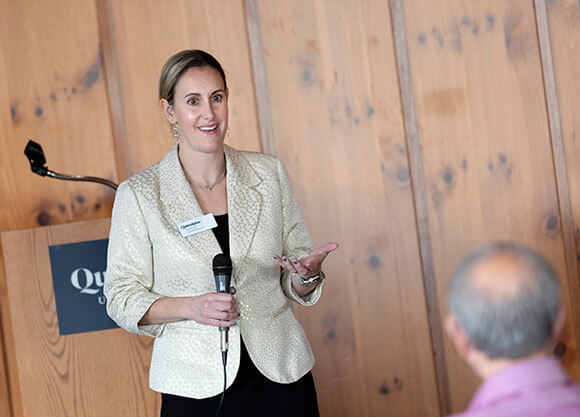
Graduate students help businesses transform plans into reality
October 04, 2021

October 04, 2021

Guided by Assistant Professor of Management Amy Paros, students work with business owners to produce and execute a detailed plan for a new project or initiative.
The parameters around how students select their business are simple: They may not work at the business, or be related to someone that does.
“I purposely give students less guidance as I want them to care about the who and why of the project,” said Paros. Students are encouraged to reflect on their daily lives and personal experiences to choose a business they would like to help.
The results of the semester-long course have been impressive to say the least: This Spring, 38 business students volunteered more than 1,760 hours of project management planning and execution to a variety of businesses.
More than half of the projects benefit the Quinnipiac community and surrounding area, but students have worked with businesses as far away as Poland and China.
A student hailing from Warsaw partnered with a friend to plan the opening of a Polish bagel shop, while another student worked with individuals in her native Tianjin to establish a charter school.
Localized projects include assisting the Cheshire Chamber of Commerce organize its annual fundraiser, which facilitates the revenue to cover the following year’s operating expenses. One student helped to expand a local mechanic’s workspace, and another planned Liuzzi’s, a cheese manufacturer’s, conversion to a new facility.
“Students learn a cohesive way to manage and increase likelihood of success in terms of launching a project,” said Paros.
Students spend the first five weeks of MG-603 Project Management pitching businesses, then developing a project charter for the chosen organization. This plan includes a full schedule, including all tasks, costs, labor and procurement costs when applicable.
As students build the plans, they also identify potential risks for companies, along with recommendations on how to mitigate them. Once the project is approved, students often play a pivotal role in its execution.
For example, QU alumni John Opie ’19, MBA ’21, helped Liuzzi find a real estate agent; choose land for the new manufacturing site; process inventory; plan to move equipment; and decide how to conserve perishable food during these transitions.
When COVID-19 hit, many of Quinnipiac’s management students focused on helping local businesses survive an unprecedented time. Students worked with brick-and-mortar stores to build digital shops, move inventory online and develop curbside pickup services. One student partnered with a nutritionist to launch a telehealth line, which is now a new source of revenue for the company.
Working with nonprofits to reopen safely was another way Quinnipiac students shared their learning with the community. A student helped a local YMCA establish a safety protocol, including standardized sanitation practices, temperature checks and nursing station guidelines.
“Students worked to find opportunities that would help to solve the pressures of the pandemic,” said Paros.
For many students, this community focus extends past emergency circumstances to issues such as social change and equity. A recent project helped to create a pronoun training lesson, while another helped to launch a podcast for a business.
These experiences not only prepare Quinnipiac students for their careers, but often result in initiatives businesses previously deemed unlikely to transpire.
“In class, we talk about the challenges of making a connection,” said Paros. “Students learn the importance of constant communication with stakeholders, and I’m amazed at how they are applying their learning in real time.”
Quinnipiac Today is your source for what's happening throughout #BobcatNation. Sign up for our weekly email newsletter to be among the first to know about news, events and members of our Bobcat family who are making a positive difference in our world.
Sign Up Now